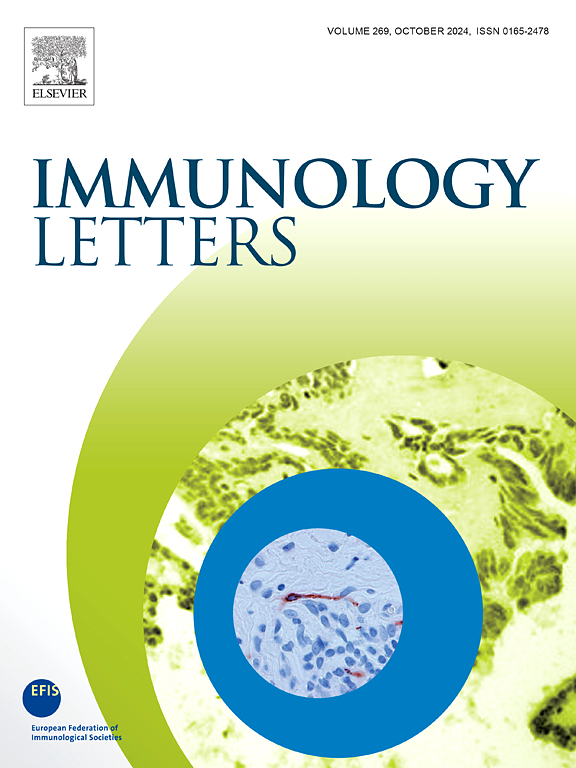Functional alterations in colonic CD4+T and regulatory T cells drive immune imbalance in ulcerative colitis
IF 2.8
4区 医学
Q3 IMMUNOLOGY
引用次数: 0
Abstract
Immune imbalance plays a key role in the pathogenesis of ulcerative colitis (UC). The changes in CD4+ T cells and regulatory T cells (Tregs) in colonic T cells have an important relationship with UC. It is of great significance to elucidate the functional characteristics of CD4+ cells andTregs in UC patients. This study aimed to inquire into changes in functional markers of CD4+T cells and Tregs, including Helios, Bcl6, CTLA-4, CD226, TIGIT, PD-1 and ICOS. DSS-induced colitis was established in Balb/c mice and lymphocytes from spleen, mesenteric lymph nodes (MLNs), peripheral blood, and colon tissue were obtained. CD4+T cells and Tregs were analyzed by flow cytometry. We found that Helios+ and Bcl-6+ proportions were increased in colonic CD4+T cells of DSS-induced colitis mice. CD4+FoxP3+CXCR5-Tregs were significantly elevated in the colon of colitis mice, with CTLA-4+ percentages increased. Naïve subsets in colonic CD4+T and Tregs were significantly reduced, while effector T-cell subsets were increased in colitis mice. TIGIT+ and CD226+ percentages were significantly increased in both colonic CD4+T cells and Tregs of colitis mice. Both PD-1+ and ICOS+ percentages in colonic CD4+T cells and the ICOS+ percentage in colonic Tregs were significantly increased in colitis mice. In conclusion, functional molecules related to CD4+T cells and Tregs in colonic T cells are altered in UC, often adopting an activated phenotype. These changes may be associated with the pathogenesis of UC and could potentially serve as clinical therapeutic targets.
溃疡性结肠炎患者结肠CD4+T和调节性T细胞功能改变导致免疫失衡
免疫失衡在溃疡性结肠炎(UC)的发病机制中起着关键作用。结肠T细胞中CD4+ T细胞和Treg细胞的变化与UC有重要关系。阐明UC患者CD4细胞和调节性T (Treg)细胞的功能特征具有重要意义。本研究旨在探讨CD4 T细胞和Tregs功能标志物Helios、Bcl6、CTLA-4、CD226、TIGIT、PD-1和ICOS的变化。在Balb/c小鼠中建立dss诱导的结肠炎,并从脾脏、肠系膜淋巴结(MLNs)、外周血和结肠组织中获得淋巴细胞。流式细胞术检测CD4+ T细胞和Tregs。我们发现dss诱导结肠炎小鼠结肠CD4+细胞中Helios+和Bcl-6+的比例升高。结肠炎小鼠结肠中CD4+FoxP3+CXCR5- Tregs显著升高,CTLA-4+百分比升高。结肠炎小鼠结肠CD4和treg中的Naïve亚群显著降低,而效应t细胞亚群增加。结肠炎小鼠结肠CD4+细胞和treg细胞中TIGIT+和CD226+百分比均显著升高。结肠炎小鼠结肠CD4细胞中PD-1+和ICOS+百分比以及结肠treg细胞中ICOS+百分比均显著升高。综上所述,UC患者结肠T细胞中与CD4+ T细胞和Tregs相关的功能分子发生改变,通常表现为活化表型。这些变化可能与UC的发病机制有关,并可能作为临床治疗靶点。
本文章由计算机程序翻译,如有差异,请以英文原文为准。
求助全文
约1分钟内获得全文
求助全文
来源期刊

Immunology letters
医学-免疫学
CiteScore
7.60
自引率
0.00%
发文量
86
审稿时长
44 days
期刊介绍:
Immunology Letters provides a vehicle for the speedy publication of experimental papers, (mini)Reviews and Letters to the Editor addressing all aspects of molecular and cellular immunology. The essential criteria for publication will be clarity, experimental soundness and novelty. Results contradictory to current accepted thinking or ideas divergent from actual dogmas will be considered for publication provided that they are based on solid experimental findings.
Preference will be given to papers of immediate importance to other investigators, either by their experimental data, new ideas or new methodology. Scientific correspondence to the Editor-in-Chief related to the published papers may also be accepted provided that they are short and scientifically relevant to the papers mentioned, in order to provide a continuing forum for discussion.
 求助内容:
求助内容: 应助结果提醒方式:
应助结果提醒方式:


